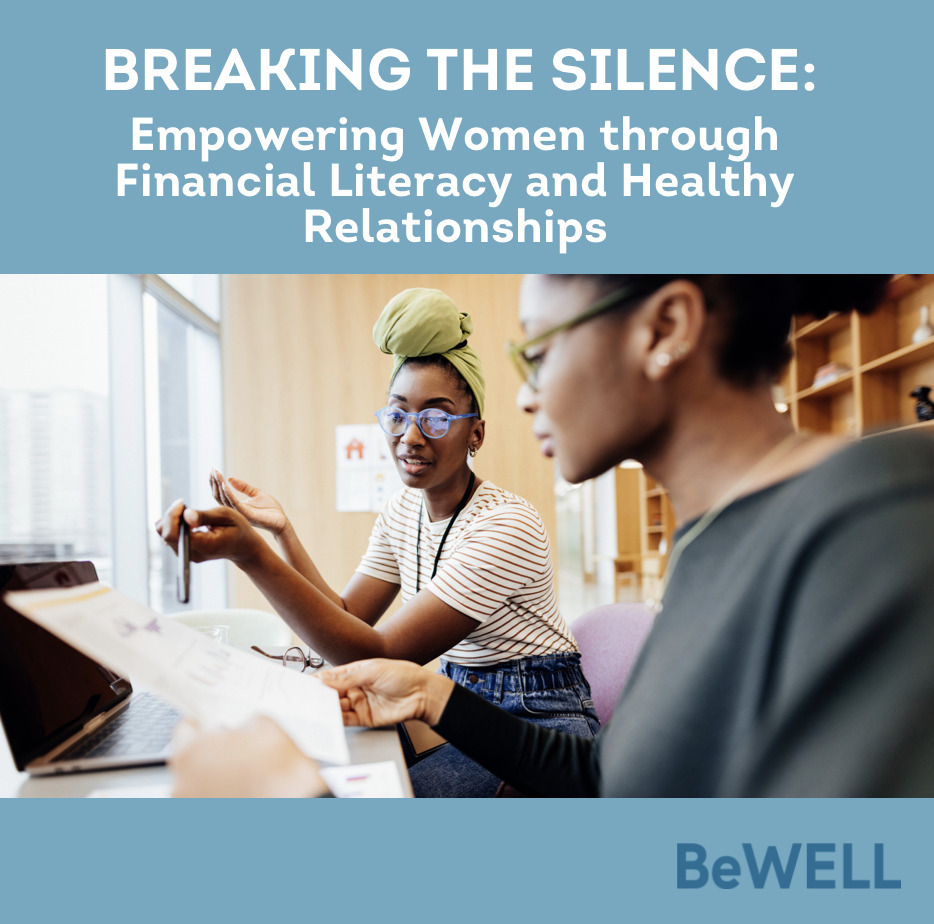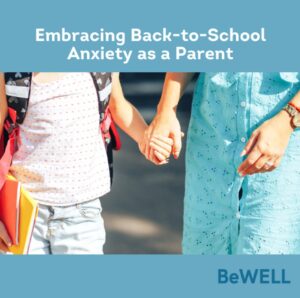Money makes the world go round, yet it is a touchy topic for many, and one that carries a weight of emotions for many women. Many of us have been taught that discussing our finances is impolite or taboo, leading to a sense of shame or embarrassment around our money habits. Or we simply haven’t been educated about finances, making it feel overwhelming to even begin the conversation. Speaking openly about finances at work, at home, or even amongst our friends can be a source of discomfort and even shame, due to societal expectations, our own narrative, and a lack of education in financial matters. But the truth is, avoiding conversations around money can have serious consequences for both our mental health and even our relationships.
So let’s start to break the stigma surrounding money! Our aim at BeWell is to empower you to take action when it comes to personal finances, while prioritizing your well-being.
Join us on Tuesday, October 24 in our Hoboken office for a financial empowering event;
EmpowHERing: A Women’s 101 to Mastering Financial & Mental Health
REGISTER HERE!
The Impact of Financial Literacy
Financial literacy is the foundation upon which women can build their financial futures, but sadly, it is an area where many women fall behind. Societal factors, like the gender pay gap, for example, places women at an inherent disadvantage, making it more challenging to secure financial stability. The high cost of childcare is another restriction that can impact many women’s ability to invest in their own financial education.
But financial literacy, and the lack thereof, often starts much earlier in childhood. In our (heteronormative) society, long-standing gender roles often depict men – fathers, husbands, brothers – as the financial caretakers. This narrative presents a challenging barrier for many women seeking to explore and understand their own relationship with money. Women may fear negative judgment or pushback as they challenge these expectations, causing them to shy away from openly discussing their financial concerns or pursuing financial literacy.
However, by equipping ourselves with financial knowledge, we can regain control and find empowerment. There are numerous resources available to women such as workshops, coaching services, and online platforms dedicated to promoting financial literacy in women. Educating ourselves about budgeting, investing, and creating financial plans can provide women with a sense of confidence and help break down the barriers surrounding money conversations.
Financial Literacy and Mental Health
Financial stress is consistently reported as one of the top stressors in American society. The burden of financial worries weighs heavily on mental well-being, and women tend to bear the brunt of this stress, but why is it stressing us out more than our male counterparts and partners?
Financial stress weighs significantly on women for several reasons, largely tied to societal expectations and inequalities present within our systems. Women often report higher stress levels over matters such as home improvements, emergency funds, non-essentials, significant household items, funding retirement, ensuring for the family’s future, and medical bills. Basically, we are worried about how to take care of everyone and everything all the time, and that takes money.
The pandemic also exacerbated the problem, with more women’s mental and financial well-being hitting troubling lows, partially because of job losses. Women lost about 5.1 million jobs during the first year of the pandemic, accounting for 53.5% of total jobs lost. This increase in job loss, combined with added stressors such as supporting distance learning for children or caregiving for other family members, has heightened the financial stress experienced by women. Many individuals are still struggling with the stress, fear, and anxiety the pandemic caused them.
Historical gender roles have not traditionally prioritized financial literacy for women, making it more challenging for women to feel financially empowered. A case in point is that women may find themselves in financial hardship post-divorce, due to financial decisions made during their marriage. This further perpetuates financial stress for women as they might suddenly find themselves dealing with the responsibilities they haven’t managed before.
By developing financial literacy skills, women can actively manage their money, set achievable goals, and alleviate anxiety caused by monetary concerns. Gaining a clearer understanding of personal finances enables women to create budgets, devise saving strategies, and make informed decisions about investments. Acquiring financial literacy goes hand-in-hand with fostering mental well-being and establishing a solid foundation for a secure future.
The Role of Healthy Relationships in Money Discussions
In addition to individual financial empowerment, healthy and open communication within relationships is vital to alleviating the stigma surrounding money. Discussing financial matters with partners, friends, and close family members can help foster a sense of shared responsibility and mutual support.
However, it is important to acknowledge that discussions regarding money can become painful points of contention within relationships. Financial disagreements often arise due to varying attitudes, values, and spending habits. It is crucial to approach these conversations with empathy, vulnerability, and a commitment to finding common ground. Therapy is a great solution for couples who struggle to communicate openly and honestly about finances, or who find money to be a point of contention in their relationship.
Relationships and Financial Abuse
Unfortunately, money can become a tool for manipulation and control within relationships, leading to financial abuse. In fact, financial abuse occurs in 98% of domestic abuse cases.
What is financial abuse?
Financial or economic abuse is when a partner has control over the other’s ability to access, acquire, use, or maintain economic resources. This power diminishes the victim’s capacity to support themselves and forces dependence. Financial abuse is reported as the main reason victims stay or return to an abusive relationship, especially when their relationship involves children.
Recognizing the signs of financial abuse is essential for maintaining one’s mental well-being and financial independence. Some warning signs include a partner exerting control over finances, limiting access to money, or coercing a partner to take on excessive financial responsibilities without consent.
Seeking support from trusted friends, family members, or professional resources such as a therapist can help individuals navigate the complexities and power imbalances inherent in abusive financial dynamics. Remember, you deserve financial autonomy and a relationship built on trust, respect, and open communication. If you or someone you love is experiencing financial abuse, a beWell Therapist is here to help.
Taking Action and Breaking the Stigma
Money remains a sensitive topic for many women, but by prioritizing financial literacy and fostering healthy relationships, we can alleviate the stigma and take control of our financial futures. Educating ourselves about personal finance not only empowers us but also positively impacts our mental well-being.
Talking openly about our finances, vulnerabilities, and goals can pave the way for more productive and understanding conversations. It allows us to support and learn from one another, dismantling the shame and embarrassment often attached to financial matters.
At Be.WELL, we understand that stress and anxiety about money can take a toll on your overall well-being. Our compassionate therapists are here to provide a safe and supportive space where you can openly explore and address your financial worries. Through personalized therapy sessions, we can help you develop coping strategies, build resilience, and enhance your financial literacy, all while prioritizing your mental health. Remember, you don’t have to face the burden of money-related stress alone – let Be.WELL be your guiding light on the path towards financial well-being and peace of mind.
Want to learn more?
Join us on Tuesday, October 24 in our Hoboken office for a financial empowering event.



